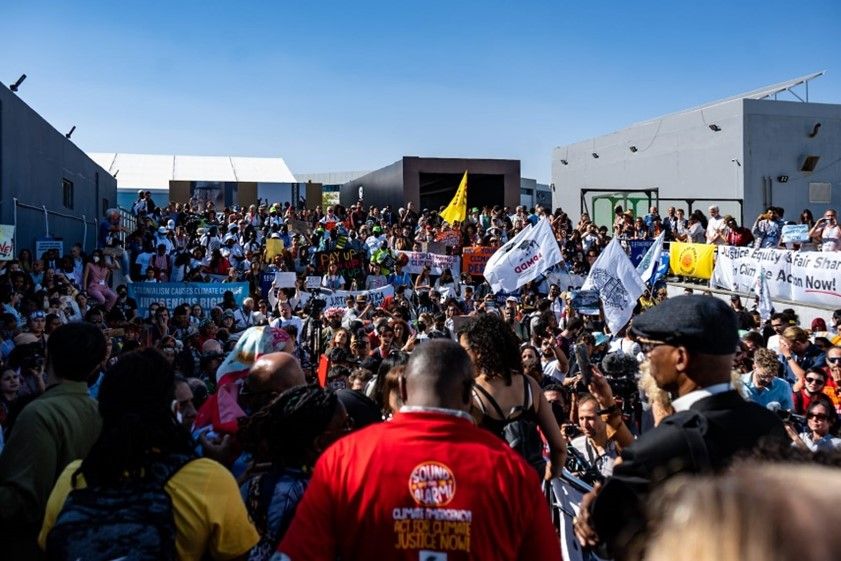
COP 27 Initial reflections
I attended the UN climate negotiations (COP27) as part of the ITUC international trade union delegation.
To start with there were two big issues with COP 27:
- Holding a huge event in the desert means a huge carbon footprint and a load of greenwashing (I spotted someone watering the grass under a board that said “SAVE THE PLANET!”)
- Holding COP in a poor human rights regime means a load of human rights washing and risking being complicit with that regime (An estimated 60 thousand political prisoners are detained without fair trial in Egyptian jails. )
As the ITUC delegation, we were there primarily to push the Just Transition agenda with labour rights and human rights as its core. The Saudi government were calling for a Just Transition with an entirely different definition, which was more about protecting their right to extract oil.
“We want a just transition of the workforce through social dialogue (involving government, labour and employers, decent work, labour rights, social protection and additional consultation with affected stakeholders consistent with human rights and equity, as articulated in the Paris Agreement and the ILO Guidelines on Just Transition.”At the close of the COP, there was mention of human rights in Just Transition but only with regards to “considering human rights with reference to the host country’s laws” so little protection there. In relation to labour rights and social dialogue, this has yet to be included.
Of course as a delegation we were also lobbying to keep the aim to limit global heating to 1.5 degrees alive, in common with the UK and other governments (in words if not action!) and other civil society groups.
Why 1.5? Because of all the stories I had heard for years, but now heard in person, from those in low lying Pacific Islands, Pakistan, Bangladesh, Somalia and indigenous lands, that are already so badly impacted by the current level of warming; 1.1 degrees. In one of my education side events we heard from Sifiso from the Zimbabwe teaching union; twenty of their schools were swept away just this year alone in cyclones which have increased and become ever more severe. And the fact that with the current rise in emissions since Glasgow, we are headed for 2.7 degrees’ warming, which will be catastrophic.
My most emotional reaction was to hearing from four indigenous young people who’d experienced oil spills, sea level rise and forest decimation on their lands and they were at the same time utterly despondent and also fiercely angry and determined; a YOUNGO representative from the Brazilian rainforest said “We are now fighting with our lives to protect the small amount of what forest is left”.
Regarding education, (my sector), quality climate education was a prominent topic at COP, led by youth activists - the same activists governments like to exploit for photo opportunities (a process known by the young as “youthwashing”). Whilst I support this, as a trade unionist for me there is so
much more at stake including the need for resilience to the effects of climate change - the sustainability of the education system, retrofitting of buildings, the health and safety and protection of workers, all through a just transition, and, of course, proper funding of public services; an issue my co-delegate and myself would like to see having a higher profile in future COPs and all discussions around climate change.
I experienced a great deal of avoidance from UK negotiators that I attempted to lobby, in common with my co-delegate from UNISON. I also experienced UK government representatives lying about education in public meetings.Barroness Barran announced all the initiatives the UK government had implemented in terms of climate education and sustainability despite the fact that we know this strategy is not yet implemented, has no funding attached as yet and has not been shared with teachers.
The thing that gave me most hope was the march and rally for human rights and for people not profit on my penultimate day there. The protest was massive, angry and determined and blocked areas that we had been told to keep clear. People power won and I believe this contributed to the one big progressive step made by international negotiators at this COP: the loss and damage agreements made at the eleventh hour.
Alaa Abd El-Fattah’s (Egyptian-British writer and political prisoner in Egypt) sister Sana’a was there against all odds. Shortly afterwards her mother received a letter from Alaa and an agreement for her to visit.
Stay Updated
Want to hear about our latest news and blogs?
Sign up now to get it straight to your inbox
